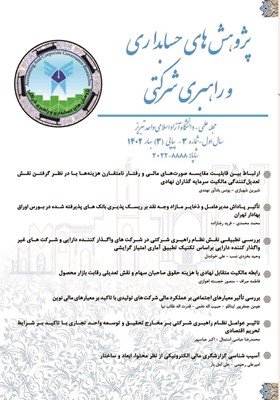ارتباط بین قابلیت مقایسه صورتهای مالی و رفتار نامتقارن هزینهها با در نظر گرفتن نقش تعدیلکنندگی مالکیت سرمایه گذاران نهادی
محورهای موضوعی : راهبری شرکتی
شیرین شهبازی
1
,
یونس بادآور نهندی
2
*
![]()
1 - دانش آموخته کارشناسی ارشد حسابداری، موسسه آموزش عالی غیرانتفاعی سراج، تبریز، ایران
2 - دانشیارگروه حسابداری،واحد تبریز،دانشگاه آزاد اسلامی، تبریز، ایران،
کلید واژه: قابلیت مقایسه صورتهای مالی, رفتار نامتقارن هزینهها, مالکیت سرمایهگذاران نهادی,
چکیده مقاله :
رفتار نامتقارن هزینهها یکی از پدیدههایی است که از تضاد منافع بین مدیران و مالکان نشات میگیرد. قابلیت مقایسه صورتهای مالی با تعیین سطح هماهنگی بین رویه های حسابداری شرکتهای مختلف، موجب شفافیت محیط اطلاعاتی میشود و امکان ارزیابی صحیح عملکرد و تخصیص بهینه منابع را فراهم میآورد. مالکان نهادی نیز به عنوان یکی از ارکان نظام راهبری شرکتی، نقش بااهمیتی را در نظارت بر مدیریت ایفا میکنند. بر این اساس، پژوهش حاضر به مطالعه ارتباط بین قابلیت مقایسه صورتهای مالی و رفتار نامتقارن هزینهها با در نظر گرفتن نقش تعدیلکنندگی مالکیت سرمایهگذاران نهادی میپردازد. جامعه آماری پژوهش شامل شرکتهای پذیرفته شده در بورس اوراق بهادار تهران برای دوره زمانی 1392 تا 1399 است که با استفاده از روش حذف سیستماتیک، تعداد 139 شرکت به عنوان نمونه آماری انتخاب شده است. روش پژوهش از نوع علی پس رویدادی و روش تجزیه و تحلیل دادهها، از نوع رگرسیون خطی چند متغیره است. نتایج حاصل از پژوهش نشان میدهد که بین قابلیت مقایسه صورتهای مالی و رفتار نامتقارن هزینهها ارتباط منفی وجود دارد؛ همچنین مالکیت سرمایهگذاران نهادی ارتباط منفی بین قابلیت مقایسه صورت های مالی و رفتار نامتقارن هزینهها را تشدید میکند. بنابراین، قابلیت مقایسه صورتهای مالی و مالکیت سرمایهگذاران نهادی در کاهش پیامد منفی تضاد منافع بین مدیران و مالکان و تامین هدف استفاده بهینه از منابع، نقش مکمل هم را ایفا میکنند.
The asymmetric behavior of costs is one of the phenomena that originates from the conflict of interests between managers and owners. The ability to compare financial statements by determining the level of coordination between the accounting procedures of different companies makes the information environment transparent and provides the possibility of correct evaluation of performance and optimal allocation of resources. Institutional owners, as one of the pillars of the corporate governance system, play an important role in monitoring management. Based on this, the current research examines the relationship between the comparability of financial statements and the asymmetric behavior of costs with considering the moderating role of institutional investors’ ownership. The statistical population of the research include the companies admitted to the Tehran Stock Exchange for the years since 2013 to 2020, and 139 Firms were selected as a statistical sample using the systematic elimination method. The research method is post-event and the data analysis method is multivariate linear regression. The results of the research showed that, there is a negative relationship between comparability of financial statements and asymmetric behavior of costs. Also, ownership of institutional investors exacerbates the negative relationship between comparability of financial statements and asymmetric behavior of costs. Therefore, the comparability of financial statements and the ownership of institutional investors play a complementary role in reducing the negative consequences of conflicts of interest between managers and owners and providing the goal of optimal use of resources.
_||_

